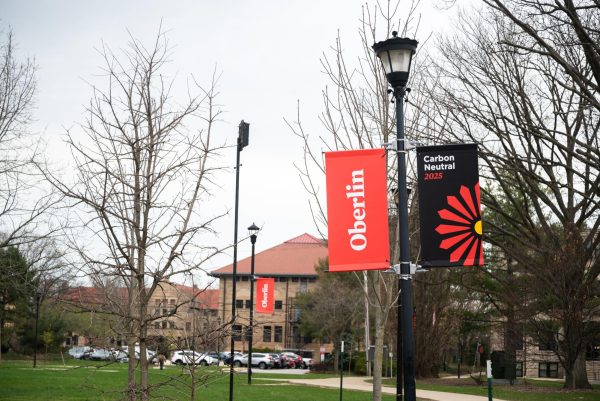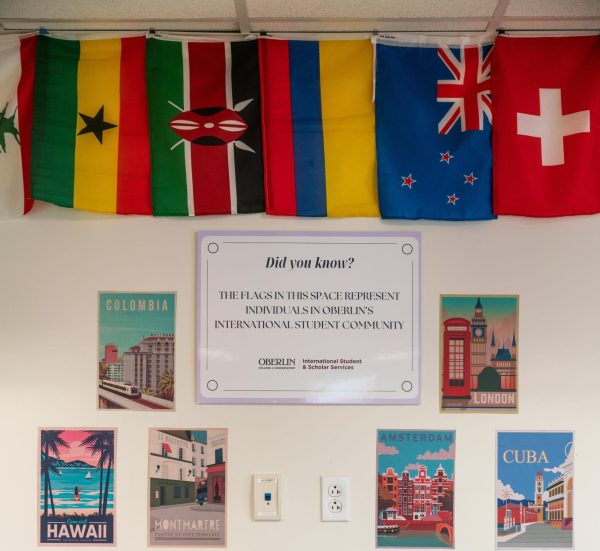Many International Students Remain in U.S. Due to COVID-19 Travel Restrictions
Travel restrictions and visa limitations have prompted many current international students to remain in the U.S. rather than return home for the summer. The College is offering on-campus room and board to international students who wish to remain in the country until the start of fall-semester classes while other students have opted to stay with family members or friends.
For international students considering returning home for the summer, the decision is complicated by uncertainty that they may not be able to travel back to the U.S. if in-person classes resume in the fall. College first-year and member of the Student Senate International Students Working Group Latifa Tan has been grappling with the question of whether to return home to Guangzhou, China, or to continue living with relatives in Arizona, where she is currently staying.
“The biggest impact [of COVID-19] is that now I have no idea whether I should/can go back home this summer,” Tan wrote in an email to the Review. “I actually tried to buy a ticket back home earlier this month, but my tickets were canceled due to the restriction on cross-border flights.”
The College recommends that international students remain in the U.S. until in-person classes resume. Director of the International Students Resource Center Josh Whitson explained his concerns that the current travel restrictions could prevent students from journeying back to the U.S.
“Depending on where the student travels through, if they can’t make it home it may not be possible to return to the U.S. during this time either,” Whitson wrote in an email to the Review. He also noted that the temporary closure of U.S. embassies around the world poses the risk that students who need to renew their visas may not be able to do so in time to return to the U.S.
However, if students with F-1 student visas or J-1 exchange visas remain in the U.S. and maintain their student statuses, they can legally stay in the U.S. with expired visas. Unlike the B-1 business or B-2 tourism visas, which specify an exact date when visitors must leave the U.S., F-1 and J-1 visas allow individuals to stay as long as they maintain their student status.
Usually, in order to maintain their status as students, international students are restricted from taking online classes and traveling outside of the U.S. for over five months. However, the government has been more lenient with these regulations in light of the pandemic.
“If you’re leaving because of the crisis, you’re engaged in remote learning,” Whitson said. “Your seamless record, your F-1 visa, everything will remain intact. So, I’ve actually been pretty happy [about] the way the government responded. There’s always room for improvement of course, but this is more than we normally see from them in terms of supporting international students and sort of bending the rules due to a situation like this.”
While some international students, like Tan, are either staying with family or friends or renting an apartment in the U.S., others have remained in Oberlin housing. Of the 225 students currently on campus, roughly 197 are international students, according to Whitson.
“Residential Education is pleased to offer short-term and long-term housing for any student who is currently on campus and in need of housing over the summer,” Andy Sadouskas, Assistant Dean and Director of Residential Education, wrote in an email to students in on-campus housing on May 11.
As of May 18, students who plan to stay on campus through the summer have condensed to housing in Langston and Noah Halls, where they live in single rooms, with vacant rooms between each occupied one in order to adhere to safe distancing practices. Students who plan to vacate by June 1 have been permitted to remain in their current housing situations.
“The plan is still to consolidate because maintaining the entire physical footprint is really hard on the staff,” Vice President and Dean of Students Meredith Raimondo explained. “It creates extra demands on the custodial staff, on the res-ed staff, on campus safety.”
Summer housing rates are $100 per week, plus a mandatory meal plan priced at $158.20 for 14 meals or $179.20 for 21 meals per week. Although housing and dining costs are reduced compared to normal prices, remaining on campus still represents an additional financial strain for international students and their families.
“We’re aware that people are stretched thin and we’re going to try to make the cost of housing and dining as reasonable as we possibly can, and certainly we’ll also offer financial support based on need,” Raimondo said. “So if somebody was in a situation [where] maybe they were in a pretty good financial situation before COVID and now the country they’re from has been dramatically affected, things are shut down, family members have lost jobs — we’ll want to look at that and see what kind of help that we can offer.”
When the majority of the student body vacated campus this past March, the College established a Student Emergency Aid Fund that garnered $66,487 in donations. The College awarded the money to students who needed financial assistance traveling home, acquiring the technology necessary to complete classes remotely, or paying for rent and groceries. Funding is distributed in consultation with the Office of Financial Aid. The $728,674 that the College received as part of the CARES Act is restricted by federal guidelines and can only be awarded to U.S. citizens — not undocumented, DACA, or international students.
“In terms of international students, I suspect this is where we will rely on institutional support funds and look at need,” Raimondo said.
The College is also committed to helping graduating international students who need housing assistance as part of their transition to postgraduate life, according to Ramondo.
Whitson recommends that graduating international students apply for Optional Practical Training, which allows students graduating from U.S. colleges to pursue employment in their field of study for one year. STEM majors have the additional opportunity to apply for a 17-month extension to their OPT.
“From an immigration perspective, my advice for graduating seniors that are uncertain about what they will be doing given the current crisis is to keep their options open,” Whitson wrote. “One way to maintain their student status in the U.S. so they do not need to leave is to apply for OPT.”
Whitson also emphasized that if students do not apply for OPT within 60 days of graduating, their options for remaining in the U.S. close. At the time of publication, there have been no changes in OPT policy in response to the COVID-19 pandemic.






